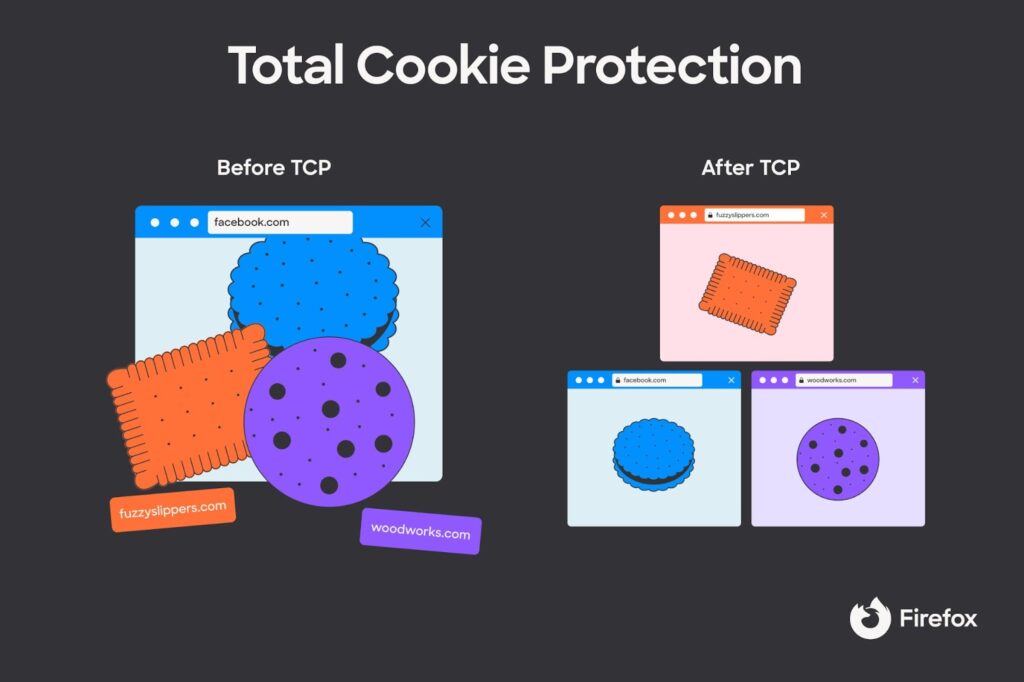Very good! Please remove anonym/PPA, DoH to cloudflare, Google search, telemetry, and pocket next, and I’ll make a consideration to stop calling your browser malware!
Shocker, FF troll hates on FF even when it does good things
1 step forwards 3 steps back is still 1 step forward 3 steps back
Couldn’t help but notice there were zero “steps back” in this post. Are they in the room with you now?
For those who don’t care to read the full article:
This basically just confines any cookies generated on a page, to just that page.

So, instead of a cookie from, say, Facebook, being stored on site A, then requested for tracking purposes on site B, each individual site would be sent its own separate Facebook cookie, that only gets used on that site, preventing it from tracking you anywhere outside of the specific site you got it from in the first place.
Isn’t this basically Firefox’s version of the third party cookie block that Chrome rolled out a few months ago? Or am I missing something here?
I mean, it’s good news either way but I just want to know if this is somehow different or better.
Sites are much more contained now. Is much more like a profile per site.
Disabling cross site cookie is already a thing for decades…
Same with Do Not Track requests.
Disabling cross site cookies and allowing them to exist while siloed within the specific sites that need them are two different things.
Previous methods of disabling cross site cookies would often break functionality, or prevent a site from using their own analytics software that they contracted out from a third party.
Thank you for your explanation, tbat greatly clears up my confusion.
TBH, if a person’s concern is being tracked by, for example, Facebook; then this just lets Facebook continue tracking them without directly allowing Facebook’s anaylitics customers to track them to another site directly (but indirectly that information can still be provided). But I guess for all the people giving FB and Google those proviledges better to have this than not.
Do Not Track has never really done anything, it just asks websites politely to not track you. There’s no legal or technical limitation here.
I still much rather have it than not. It also lead to the spiritual successor GPC which does actually have regulatory requirements under the CCPA.
Fair. However, it also provides websites with additional information to fingerprint you, so that’s a thing too.
I don’t know why this wasn’t the case long ago.
It increases implementation complexity of the browser and loses people who fund Firefox and contribute code $$$
Basically creates a fake VM like environment for each site.
For those who don’t care to read the full article
Or even the whole title, really
Hahahahaha so it doesn’t break anything that still relies on cookies, but neuters the ability to share them.
That’s awesome
Unless that cookie was somehow important for you to use both sites, but thats incredibly rare.
I would love to see an icon of a neutered cookie please 🥺😄.
Honestly, I thought that’s how it already worked.
Edit: I think what I’m remembering is that you can define the cookies by site/domain, and restrict to just those. And normally would, for security reasons.
But some asshole sites like Facebook are making them world-readable for tracking, and this breaks that.
Total Cookie Protection was already a feature, (introduced on Feb 23st 2021) but it was only for people using Firefox’s Enhanced Tracking Protection (ETP) on strict mode.
They had a less powerful third-party cookie blocking feature for users that didn’t have ETP on strict mode, that blocked third party cookies on specific block lists. (i.e. known tracking companies)
This just expanded that original functionality, by making it happen on any domain, and have it be the default for all users, rather than an opt-in feature of Enhanced Tracking Protection.
That’s not what I was thinking of, which was even more fundamental. But that’s good info (and another way to cover stuff in the article).
Edit: what I was thinking originally was really stupid, that 3rd-party cookies weren’t allowed at all. Which was really dumb since of course they are.
No, you weren’t far off. A single site can only get and set cookies on its domain. For example, joesblog.com can’t read your Facebook session cookie, because that would mean they could just steal your session and impersonate you.
But third-party cookies are when joesblog.com has a Facebook like button on each post. Those resources are hosted by Facebook, and when your browser makes that request, it sends your Facebook cookies to Facebook. But this also lets Facebook know which page you’re visiting when you make that request, which is why people are upset.
With this third-party cookie blocking, when you visit joesblog.com and it tries to load the Facebook like button, either the request or just the request’s cookies will be blocked.
Although that raises an interesting question. Facebook is at facebook.com, but its resources are all hosted under fbcdn.com. Have they just already built their site to handle this? Maybe they just don’t strictly need your facebook.com cookies to load scripts, images, etc. from fbcdn.com.
They’ve been doing this with container tabs, so this must be the successor to that idea (I’m going to assume they’ll still have container tabs).
Container tabs are still a thing in FF. This is based on that work, if I remember correctly.
I love container tabs. It’s one of the reasons I went back to FF.
Same, they’re an absolute game changer for me. I have to use multiple different identities in work due to separate active directories and container tabs makes it super easy
Container tabs are still useful, as they let you use multiple Cookie jars for the same site. So, it is very easy to have multiple accounts on s site.
From my experience, blocking 3rd party cookies in general doesn’t seem to make any difference for site functionality anyways. Though I never log into sites with a Google or FB account other than Google or FB sites (and rarely at all for the latter).
Starting in what versions?
Let me guess, itll still let websites see a list connected microphones and cameras with zero user interaction?
Trying
navigator.mediaDevices.enumerateDevices() .then(function(devices) { devices.forEach(function(device) { console.log(device.kind + ": " + device.label + " id = " + device.deviceId); }); })it appears to have no label and the ids are randomly generated per site.
So it still ahows the number of devices then?
Good to see Firefox still has value to provide
Firefox is awesome.
ah yes, the other TCP
Tasty Consensual Photos
Maybe they should patent it, to protect their TCP IP.
Or have some higher tier version called Ultimate Cookie Protection {UDP)
Id prefer a security security oriented Secure Cookie Total Protection (SCTP)
LOL
Wouldn’t that be Ultimate Dookie Protection?
danvit, yes
Is this different from blocking 3rd party cookies?
A little. If a third party cookie is set while you’re visiting a site, only that site will get the third party cookie back. Multiple sites can have embedded content making third party cookies, and with this change firefox will track where it was made and only give it back there.
With this change, it doesn’t matter if it’s first or third or whatever; cookies will only be given back to a site that matches much of what is in your location bar.
Does this stop me from adding to my website an iframe to facebook where facebook can keep its cookies for my user? That would be great but I doubt it.
I haven’t worked with HTML since 1999; I hate that I’m just now finding out that iframes are somehow still a thing in the modern world. What the actual fuck. Why? Don’t we have some fancy HTML5 or Ajax or something that can replace them?
Yeah i don’t know why, probably exactly because is such a neglected feature that it offers workarounds for some limitations, like in the case of cookie-related patterns.
IIRC an iframe contents is treated as a separate window, so cookies aren’t shared either
Sure, but the separate window can be on a different domain. Now you have a way to share cookies across multiple websites on different domains if all of them include an iframe to this external domain. And you can use in-browser messages (see window.postMessage()) to communicate between iframes and main window.
Indeed see sibling comment https://programming.dev/comment/11983146
That’s horrific WHY?
do not add any event listeners for
messageevents. This is a completely foolproof way to avoid security problems. 🤡🤡🤡🤡🤡🤡🤡🤡🤡🤡🤡
deleted by creator
Oracle, SAP, Redhat, all of their customer portals require it for SSO. I’m not saying it should be that way, but it is.
Chrome, I’m looking at you. When are you getting it?
Google recently cancelled their 3rd party cookie plan because they realized its not gonna work for their data harvesting goals
Never, because Chrome is a data harvesting platform.
Made by an advertising company
I wonder how long until all the distros have this.
making Firefox the most private and secure major browser
If calling home and to selected 3rd party analytics aren’t part of the metric then yes, Firefox might be the most private.
Just move to LibreWolf.
You’re aware that LibreWolf is a Firefox fork, right? The quote is literally “major browser”, which obviously precludes fairly niche forks.
Of course I am… and that’s the point. Librewolf is Firefox without the spyware.
But it’s not a “major browser.” It’s a niche fork that has valuable adjustments for power users, but would be unusable for your average non-technically inclined user. I use Librewolf myself and appreciate it, but it’s not something you can just drop on an older relative’s machine and expect to work fine. Firefox has plenty of issues out of the box with sneaking in ads and telemetry, but at the same time you still have to understand that it’s an important player in the market despite its flaws because it’s the only real mainstream competitor to an entirely Chromium-based ecosystem, and despite the issues it does have, it’s still lightyears ahead of Chrome.
Such a chad move. Respect!
Does making it the default also set it on my already-downloaded Firefox or only to new downloads? Just to know if I’ll have to manually set it.
It very probably wont change your settings for you. That would be super annoying if it changed things you set on purpose.
What if I never changed it in the first place. So before I had it on “default” and now it would still be on “default”.
Good to know anyway
I’m curious how this will affect OAuth (if at all). Does it use an offsite cookie to remember the session, or is that only created after it redirects back to the site that initiated the login?
I my experience it generally breaks it. Leveraging cookies on the auth domain is fine, but once you are redirected to another domain, that application needs to take the access and refresh tokens and manage reauthentication as a background process. Simply don’t store those things as cookies though.
I was also wondering that



















